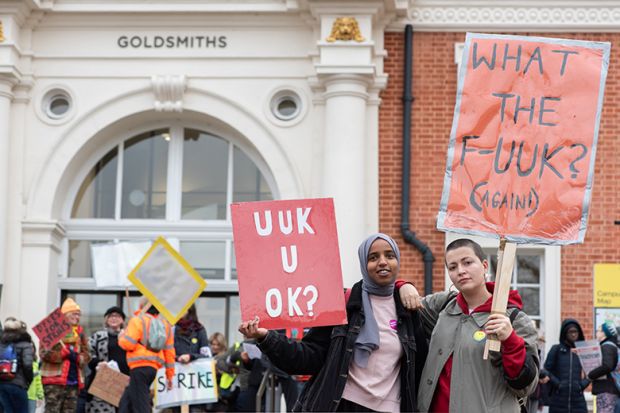UK universities have been warned to expect strike action before Christmas despite the sector’s biggest union securing a mandate at less than four in 10 of the institutions that it polled.
While separate ballots on industrial action over pay and pensions both garnered “yes” votes in excess of 70 per cent, only 58 of 152 University and College Union branches are able to walk out because of a 50 per cent turnout threshold that applies in much of the UK. Employers have suggested that the results indicate limited support for strikes.
But Jo Grady, the union’s general secretary, insisted that she was “very happy with the ballot results”.
The UCU’s higher education committee was due to meet on 12 November to decide on next steps, including whether and when to reballot some branches. However, Dr Grady said it was also likely to decide on how many days of industrial action will take place before the end of term, and what an escalation strategy would look like in the new year.
Dr Grady told Times Higher Education that it was “quite unfortunate” that “vice-chancellors were attempting to denigrate the turnout…they’re not listening to a consistent message that staff have been delivering to them.”
Despite “draconian trade union laws”, industrial action was now an almost annual occurrence in the higher education sector, with any impending strike action representing the fourth round of widespread walkouts in little over three years. Dr Grady acknowledged that many staff were exhausted by the pandemic and that the union had had only had a short window in which to conduct the ballot.
“The fact is that people are still turning out in their thousands, and even in the branches where mandates have been missed, it’s [by] a very small proportion of people,” she said. “Vice-chancellors should be listening to that message. It’s a real indicator of how broken this sector is.”
The UCU is seeking to strike on multiple issues: alongside pensions, the pay dispute is part of its “four fights” campaign, which also seeks an end to casualisation, a reduction in workloads and the end of gender and ethnicity pay gaps. Some members have criticised such a broad focus, but Dr Grady said she did not believe the union was asking for too much.
“The decisions that we make as a union are very much a product of our democratic structures,” she said. “The things that we're asking for universities to fix are not complicated.
“They’re contracts that allow people to actually not just plan their lives and live with dignity but plan their teaching and plan their professional work properly.”
Within the four fights, tackling precarious contracts was the main focus, Dr Grady said. This does not mean that any element would be forgotten, but “it’s fair to say that casualisation and workload are, in some ways, the things that hit hardest”.
Casualisation was also an intersectional issue, with women and black, Asian and minority ethnic staff more likely to be on short-term contracts, so “serious movement” on casualisation would also affect equality issues. “We keep fighting on these four fronts, precisely because they’re interrelated,” Dr Grady said.




